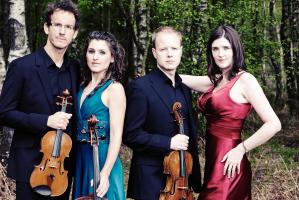Joseph Haydn has always been regarded as a happy man who wrote joyful music, so to hear his String Quartet Op.20 No 5 in F minor is to experience the darker side of his work. The Carducci Quartet, (playing for Cockermouth Music Society) who anchor one’s attention instantly with the cohesiveness of their playing which demonstrates unity of purpose, execution and total commitment at all times, played with all the seriousness the piece demands. The Adagio was lit with beauty and the Finale Fugue was full of lightness of touch contrasted with bursts of glorious sound. All four musicians are clearly at one in musical understanding and they then went on to perform contemporary composer Huw Watkins’ String Quartet (2013) in a way which made it extraordinarily compelling. Watkins is clearly a happy man, positive joy glows throughout this piece, and how fortunate he is to have such great interpreters to do the music proud. Not only was it fascinating music but it was also wonderfully well played, and I look forward to hearing more of his work in the orchestral concert on 19 November in Cockermouth’s Christ Church . The last piece in the concert was Beethoven’s String Quartet Op. 59, No 2 in E minor. This composer was not a happy man, but he was a musical genius and this shows through in a piece he wrote for “the musicians of the future” (his contemporaries finding it pretty difficult!). Here we had the musicians of the future handling this great work with apparent ease, all players so certain in their interpretation, beautiful sound at all times, finishing with a final movement (Presto) which maintained a thrilling speed without ever stepping over into a mad rush. This was quartet playing of the very highest order and those who heard Matthew Denton and Michelle Fleming (violins), Eoin Schmidt (viola) and Emma Denton (cello) were fortunate indeed.
Carducci String Quartet
